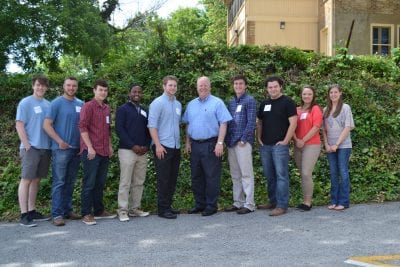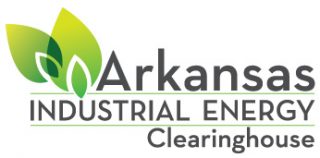Research and Outreach
Dr. Nutter performs a combination of fundamental and applied energy systems research that is motivated by achieving increased energy efficiency in buildings and industry. He has published extensively in the energy efficiency area, specifically toward the improvement of HVAC&R systems and sustainability of manufacturing/processing plants. Below are brief overviews of both major areas.
Commercial Building Energy Efficiency
HVAC Systems and Components
For more than 25 years, Dr. Nutter has performed fundamental research related to the energy performance of heating, ventilating, and air-conditioning (HVAC) equipment. System and component level research has included studies of the following equipment, materials, and related topics – accumulators, aerosol deposition, aquifer heat transfer, barometric relief dampers, boilers, carbon nanotubes, chillers, cogeneration systems, compressors, condensers, enhanced boiling, evaporators, heat pumps, indoor air quality, reversing valves, thermal insulation, thermal conductivity, thermostats, thermosyphons, and vertical bore heat exchangers.
Building Energy Simulation Modeling
Advances of research in commercial building energy use leads to a better understanding of the energy interactions between systems. The use of energy simulation models such as EnergyPlus, eQuest, or IES can help provide the necessary insight that leads to today’s high performing and most energy efficient buildings. Dr. Nutter and his students have created or used available building energy simulation models to investigate building types such as schools, big box retail, warehouses, distribution centers, offices, supermarkets, restaurants, hospitals, and motels.
Industrial Energy Efficiency
Improving Processing Energy Efficiency and Reducing Greenhouse Gases (GHGs) and Other Environmental Impacts
Gifford Pinchot once said “Conservation means the wise use of the earth and its resources for the lasting good of men”. This captures the essence of much of Dr. Nutter’s research and outreach to the state of Arkansas and beyond. As the stability and security of our nation depends so much on fossil fuels, it is only logical to be as energy efficient in our manufacturing plants and buildings as possible. The recent push toward increased renewable energy sources and the reduction of GHGs, and other environmental impacts, is directly tied to energy use and efficiency. Over the years, Dr. Nutter has partnered with faculty at the University of Arkansas and other institutions, along with industrial sponsors, to improve numerous manufacturing companies’ energy efficiency and to help them better understand the various environmental impacts associated with their manufacturing processes. For example, Dr. Nutter and others have performed life cycle assessments (LCAs) for products such as fluid milk, cheeses, pork, sweet corn, and others. See their various publications for more detail.
Arkansas Industrial Energy Clearinghouse (2010-2016)
The primary function of the Clearinghouse was to support and promote energy efficiency within Arkansas’s
industrial and manufacturing sector. The Clearinghouse was housed at the University of Arkansas’s
Mechanical Engineering Department located in Fayetteville, Arkansas. The Clearinghouse included an
on-line website for contact information and links to resources, a full time staff engineer, part-time
engineering students, and a program director (Dr. Darin Nutter). Typical Clearinghouse tasks and
activities were to:
1. Assist companies in starting an energy management program,
2. Provide independent review of energy projects,
3. Support utility Energy Efficiency Program incentives,
4. Provide an understanding of industrial system(s) energy performance,
5. Recommending energy and cost-savings opportunities,
6. Providing technical resources, such as papers, publications, and loaning instruments,
7. Maintaining up-to-date knowledge of financial incentives for energy conservation,
8. Provide on-site plant assessments and system energy/power measurements,
9. Recommend system specific experts, as needed, such as DOE system specialists, and
10. Maintain a website with Arkansas specific information and tools.
Through the years, the Clearinghouse helped over 400 Arkansas companies, of which approximately half were manufacturers. Much was learned through the many studies and system-specific interactions for these companies.
The Arkansas Industrial Energy Clearinghouse (or the ‘Clearinghouse’) was originally funded through the Arkansas Energy Office, and then by Energy Efficiency Arkansas (EEA), a partnership between the Arkansas Economic Development Commission’s Energy Office and Arkansas’ investor-owned electric and gas utilities and electric cooperatives through a ratepayer funded program approved by the Arkansas Public Service Commission.
2015 Arkansas Industrial Energy Engineering Summer Internship Program
 In 2015, nine (9) engineering students from six (6) Arkansas universities were placed across Arkansas. The program was
In 2015, nine (9) engineering students from six (6) Arkansas universities were placed across Arkansas. The program was
widely successful. The program’s purpose was to support and promote energy efficiency within Arkansas. The outcomes included:
1. providing an energy efficiency related experience to engineering students from various Arkansas universities.
2. providing much needed help to state agencies in their energy efficiency improvement efforts, including ACT 1494.
3. For the long-term, infusing Arkansas with engineering graduates that are equipped to improve the state’s economy and sustainability through energy efficiency.
Students received three days of energy efficiency training at the beginning of the summer and then
spent 10 weeks assisting their host agency with selected energy efficiency needs. During their
internships, Dr. Nutter visited each intern to discuss progress and offer assistance. All interns and their
hosts gave very favorable opinions of the program.
Quotes from state agency representatives included:
Alicia Davis (hosted Harrison Jones) said about the program, “For our agency, this program was
definitely worthwhile. Much was accomplished in a few short weeks”.
Franci Halter said, “Tyler [Starr] is performing excellently. We are utilizing him to update our data in
Portfolio Manager” and “Very favorable impression of this intern program. In my case, it was a bit of a
life saver!”
Larry Chilton (hosted Maebry Holmes) said, “An excellent opportunity to expose students to real world
applications and technologies in a production environment.”
Jeff Siebler (hosted Andrew Bakewell) said, “Good learning opportunity for students while doing useful
work for [our] organization”.
David Handwork of Arkansas State said of the summer intern program, “Very pleased. We received a
very talented young engineer that we would not have experienced / utilized outside of this program”.
Mr. Clint Harper said, “DFA Division of Building Authority (formerly Arkansas Building Authority)
thoroughly enjoyed participating in the Summer Intern Project and was exceptionally pleased with the
intern assigned, Jacob Carter and the contributions he made while with us. My overall impression of the
program based on the experience was that the intern was well prepared to perform the task assigned to
him. I can only hope that the benefits were mutual to the intern as it was to DBA.”
Jasper Lewis of his SAU intern and the program, said “Absolutely outstanding in every way. Win-win
across the board”.
The intern program was part of the Arkansas Industrial Energy Clearinghouse which was funded by Energy Efficiency Arkansas (EEA), a partnership between the Arkansas Economic Development Commission’s Energy Office and Arkansas’ investor-owned electric and gas utilities and electric cooperatives through a ratepayer funded program approved by the Arkansas Public Service Commission.
UA Industrial Assessment Center
Between 2007 and 2016, The University of Arkansas’ Mechanical Engineering Department also housed an Affiliate Industrial Assessment Center (IAC). The IAC performed no-cost energy assessments for industrial manufacturing plants. The UA’s IAC was partnered with the well established Oklahoma State IAC. IACs are located at universities across the country and sponsored by the U.S. Department of Energy’s Office of Energy Efficiency and Renewable Energy through their Advanced Manufacturing Office.
The program provided on-site plant assessments performed by Dr. Darin Nutter, P.E. of the mechanical engineering department at the University of Arkansas and his undergraduate and graduate students. Dr. Nutter’s industrial energy conservation experience spans over 30 years including experience (as course-based student, assistant director, and affiliate-director) at three DOE Industrial Assessment Centers (IAC). In addition to the detailed pre-assessment plant screening, and a utility analysis, each plant received an assessment which included a comprehensive discussion of energy-related issues with plant personnel, a walk-though of the plant from raw-materials through finished product, identification of energy conservation opportunities, data collection for engineering calculations and implementation cost estimates, and a debriefing with plant personnel.
